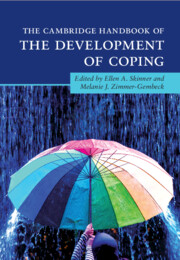Book contents
- The Cambridge Handbook of the Development of Coping
- Cambridge Handbooks in Psychology
- The Cambridge Handbook of the Development of Coping
- Copyright page
- Contents
- Contributors
- Preface
- 1 A Systems Perspective on the Development of Coping
- Part I Theoretical Perspectives on the Development of Coping
- Part II Methods for Studying the Development of Coping
- Part III Neurophysiological and Experiential Bases of the Development of Coping
- Part IV Psychological Foundations of the Development of Coping
- Part V Social Contexts and the Development of Coping
- Part VI Application and the Development of Coping
- 25 Social Media Use and Misuse, Stress, and the Development of Coping
- 26 Clinical Treatments for Child Emotional Disorders and the Development of Coping
- 27 Fostering the Development of Academic Coping
- 28 Youth Programs and the Development of Coping
- Index
- References
26 - Clinical Treatments for Child Emotional Disorders and the Development of Coping
The Case of Irritability
from Part VI - Application and the Development of Coping
Published online by Cambridge University Press: 22 June 2023
- The Cambridge Handbook of the Development of Coping
- Cambridge Handbooks in Psychology
- The Cambridge Handbook of the Development of Coping
- Copyright page
- Contents
- Contributors
- Preface
- 1 A Systems Perspective on the Development of Coping
- Part I Theoretical Perspectives on the Development of Coping
- Part II Methods for Studying the Development of Coping
- Part III Neurophysiological and Experiential Bases of the Development of Coping
- Part IV Psychological Foundations of the Development of Coping
- Part V Social Contexts and the Development of Coping
- Part VI Application and the Development of Coping
- 25 Social Media Use and Misuse, Stress, and the Development of Coping
- 26 Clinical Treatments for Child Emotional Disorders and the Development of Coping
- 27 Fostering the Development of Academic Coping
- 28 Youth Programs and the Development of Coping
- Index
- References
Summary
Difficulties in coping and emotion regulatory strategies are related to both internalizing and externalizing problems in children and adolescents. Recurring, elevated irritability is a core transdiagnostic feature of these psychological problems, and has been documented to be a predictor of psychopathology. In this chapter, we discuss the role of emotion regulation and coping in the development and management of emotion disorders in childhood and the relevancy to further advancing our understanding of chronic irritability in youth. We outline two related conceptual models for irritability in children and adolescents, extended to include the role of coping, in order to have utility in further shaping the evidence base in this field. We also evaluate published treatment studies that have tested the efficacy of psychotherapy programs in managing elevated levels of irritability disturbances in children and adolescents including youth with more severe levels of symptoms captured by the disruptive mood dysregulation disorder (DMDD) diagnosis. Treatments with the most promising findings to date include cognitive-behavioral based programs that include individual and/or interpersonal emotion regulatory, coping, and prosocial skills training components. Given that the evidence base in this field is in its infancy, we conclude by discussing future research recommendations.
- Type
- Chapter
- Information
- The Cambridge Handbook of the Development of Coping , pp. 612 - 640Publisher: Cambridge University PressPrint publication year: 2023

